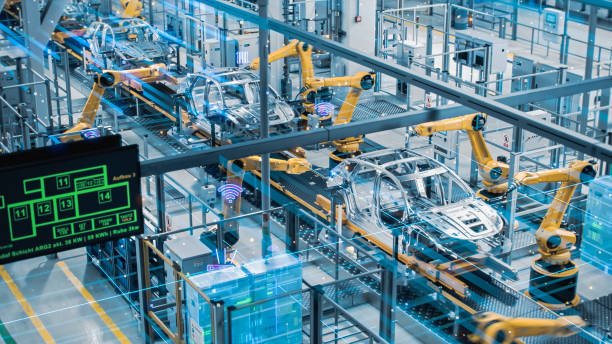Cognitive Manufacturing: Reshaping Production Paradigms
Cognitive manufacturing, a groundbreaking approach to industrial operations, is transforming production processes across sectors. This innovative methodology integrates advanced data analytics, machine learning, and artificial intelligence to create self-aware, adaptive manufacturing systems. By harnessing the power of cognitive technologies, businesses are revolutionizing their production paradigms, achieving unprecedented levels of efficiency, quality, and responsiveness in an increasingly competitive global market.

The advent of Industry 4.0, characterized by the integration of digital technologies into manufacturing processes, set the stage for cognitive manufacturing. This new paradigm built upon the foundations of automation and data exchange, introducing cognitive capabilities that could learn, reason, and make decisions autonomously.
Core Components of Cognitive Systems
At the heart of cognitive manufacturing lie several key components that work in synergy to create intelligent production systems:
-
Sensor Networks: Advanced sensors collect real-time data from various points in the production process, providing a continuous stream of information about equipment performance, environmental conditions, and product quality.
-
Big Data Analytics: Sophisticated algorithms process vast amounts of data collected from sensors, historical records, and external sources to identify patterns, anomalies, and optimization opportunities.
-
Machine Learning Models: These models continuously learn from the data, improving their ability to predict outcomes, detect issues, and recommend solutions over time.
-
Artificial Intelligence: AI systems use the insights generated by machine learning models to make autonomous decisions, adjusting production parameters in real-time to optimize output and quality.
-
Human-Machine Interfaces: Advanced visualization tools and intuitive interfaces enable seamless collaboration between human operators and cognitive systems, enhancing decision-making and problem-solving capabilities.
Transforming Production Processes
Cognitive manufacturing is reshaping production processes across industries in several significant ways:
-
Predictive Maintenance: By analyzing equipment data in real-time, cognitive systems can predict potential failures before they occur, allowing for proactive maintenance that minimizes downtime and extends machine life.
-
Quality Control: Advanced image recognition and anomaly detection algorithms can identify defects with greater accuracy than traditional methods, ensuring higher product quality and reducing waste.
-
Supply Chain Optimization: Cognitive systems can analyze market trends, inventory levels, and production capacities to optimize supply chain operations, reducing costs and improving responsiveness to market demands.
-
Energy Efficiency: By continuously monitoring and adjusting energy consumption patterns, cognitive manufacturing systems can significantly reduce energy waste and associated costs.
-
Personalized Production: The flexibility and adaptability of cognitive systems enable manufacturers to efficiently produce customized products at scale, meeting the growing demand for personalization.
Challenges and Considerations
While the potential benefits of cognitive manufacturing are substantial, implementing these systems presents several challenges:
-
Data Quality and Integration: Ensuring the accuracy and consistency of data from various sources is crucial for the effective functioning of cognitive systems.
-
Cybersecurity: As manufacturing systems become more connected and data-driven, protecting them from cyber threats becomes increasingly important.
-
Workforce Skills Gap: The transition to cognitive manufacturing requires a workforce with new skills in data analysis, AI, and advanced manufacturing technologies.
-
Initial Investment: Implementing cognitive manufacturing systems often requires significant upfront investment in technology and infrastructure.
-
Ethical Considerations: As AI systems gain more autonomy in decision-making, addressing ethical concerns and ensuring transparency becomes crucial.
Implementing Cognitive Manufacturing: Key Strategies
• Start with a clear vision and roadmap for cognitive manufacturing implementation
• Begin with pilot projects to demonstrate value and gain organizational buy-in
• Invest in robust data infrastructure and management systems
• Develop partnerships with technology providers and research institutions
• Foster a culture of continuous learning and innovation among employees
• Prioritize cybersecurity measures from the outset of implementation
• Establish clear governance structures for AI decision-making processes
As cognitive manufacturing continues to evolve, it promises to usher in a new era of industrial productivity and innovation. By embracing this transformative approach, manufacturers can position themselves at the forefront of the next industrial revolution, driving growth and competitiveness in an increasingly dynamic global marketplace. The journey towards cognitive manufacturing may be complex, but for those who successfully navigate it, the rewards in terms of operational excellence and market leadership are substantial.





